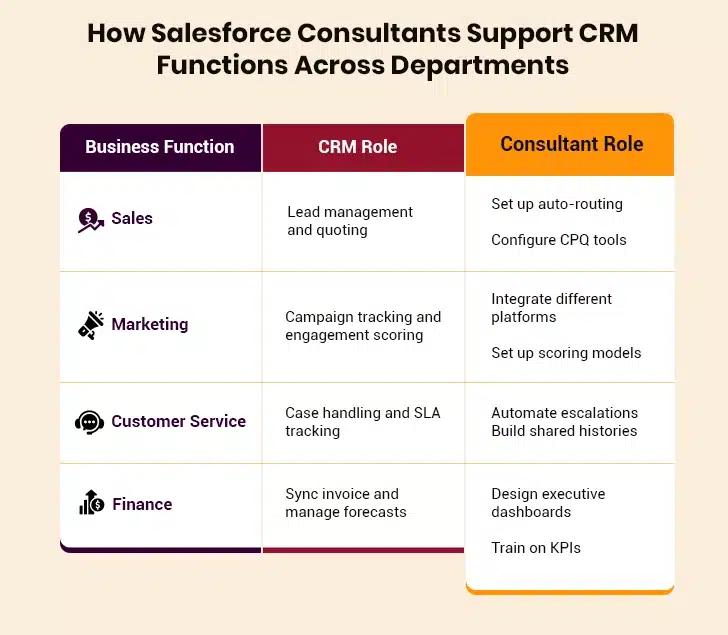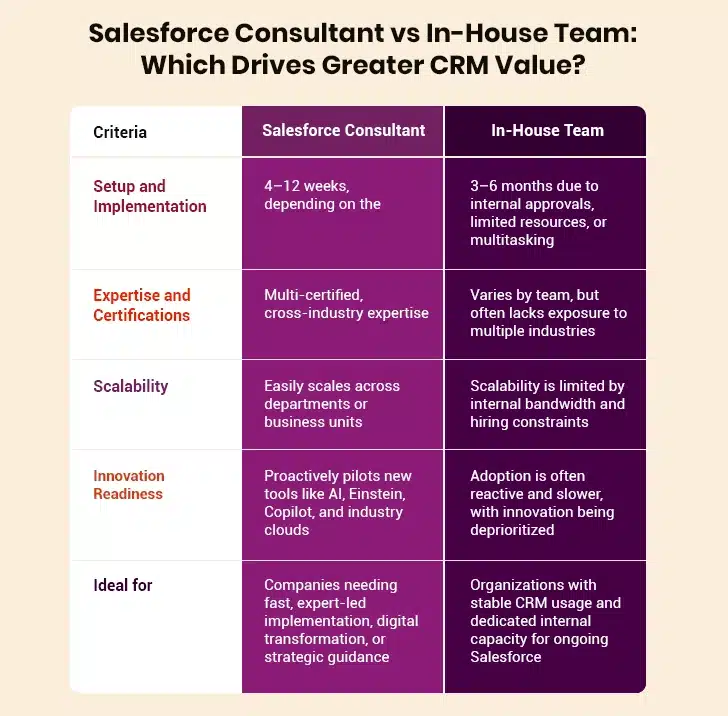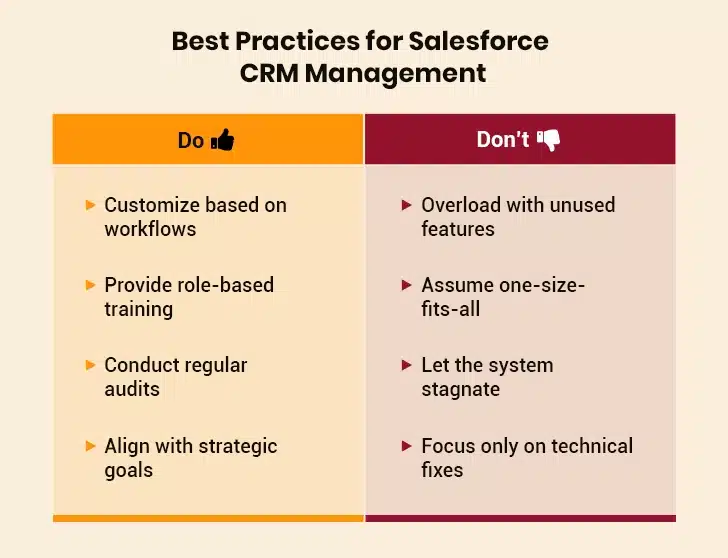“Plugging in the app might work for a department … but for companies fundamentally changing their approach to address new markets and provide new products, just turning the tool on is not going to do that. They need consultants who bring deep process and integration expertise to drive complex, enterprise-wide change.” Saideep Raj, Former Global Lead, Accenture Innovation
Digital transformation is not a single event but a continuous evolution. For many organizations, this journey begins with the adoption of a Salesforce CRM instance. However, purchasing a license and configuring standard features is not enough. Real transformation requires aligning technology with strategy, operations, and user behavior.
This alignment does not happen by chance. It is architected and refined by Salesforce consultants. These professionals are not just technical implementers; they are enablers of business modernization. They help organizations unlock the full potential of the Salesforce CRM software, guiding companies from foundational setup to enterprise-level scale-up.
In this blog, we’ll examine how Salesforce consultants facilitate digital transformation at every stage of the journey.
Table of Contents
What Does a Salesforce Consultant Do?
A Salesforce consultant helps organizations turn CRM software into a strategic business engine. They configure systems, train users, design workflows, and align CRM features with company goals to drive growth and improve customer experiences. They assess business needs and translate them into customized Salesforce solutions. By bridging the gap between technology and operations, they ensure the CRM delivers real, measurable value.
Why Do Organizations Need Salesforce Consulting Services?
Organizations need Salesforce consulting to unlock the platform’s full potential. Out-of-the-box features rarely fit unique business workflows, making expert guidance essential for effective customization, adoption, and long-term ROI. All in all, without consulting, Salesforce often becomes an expensive to-do list. Consultants optimize workflows, streamline data management, and deliver seamless user experiences.
The Role of Salesforce Consultant at Every Stage of the CRM Journey
A Salesforce consultant plays a unique, evolving role at each stage of the CRM journey. They guide strategy, enable adoption, drive alignment, and scale value across the organization. Here’s how consultants provide value at every phase:
Identifying Organizational Bottlenecks Before Implementation
A Salesforce CRM system should not simply replicate existing manual or outdated workflows. Consultants begin by conducting in-depth discovery and analysis to uncover inefficiencies, redundancies, and points of failure across departments.
For instance, in a mid-sized manufacturing firm, sales activities may still be recorded in spreadsheets, while customer service logs are maintained separately. Leadership may lack real-time reporting, and data entry could be inconsistent across teams. Salesforce consultants assess these challenges holistically. They examine:
- Data architecture and accessibility across business units
- Workflow dependencies between departments
- Gaps in process accountability
- Readiness of users for digital tools
This diagnostic phase ensures that Salesforce is not implemented as a patchwork solution but as a strategic framework tailored to the organization’s specific needs.
Designing a Fit-for-Purpose Salesforce Architecture
Once internal challenges are mapped, consultants move to solution design. The Salesforce CRM software encompasses a wide range of features, but not all of them apply to every organization. An experienced Salesforce consultant configures the system according to precise business use cases. This design process includes:
- Creating custom objects and fields aligned with core operations
- Building user roles and permission sets based on responsibilities
- Defining data visibility rules to protect sensitive information
- Designing approval workflows to match internal governance
- Integrating core metrics into customized dashboards
Rather than overloading the platform with every possible feature, consultants focus on purposeful configuration. The objective is clarity, usability, and adoption.
Training and Change Management for Sustainable Adoption
The Salesforce CRM system only delivers value when users engage with it consistently and accurately. A Gartner study shows that initiatives lacking effective change management practices experience a high failure rate of 50%, with only 34% achieving apparent success. Consultants understand that technology adoption is just as much a people challenge as a technical one.
Effective Salesforce consultancy services always include structured change management. This involves:
- Role-based training sessions using real business scenarios
- Creation of quick-reference user guides and videos
- Feedback mechanisms for continuous improvement
- Identification of internal “champions” to drive peer learning
Consultants provide both technical instruction and context. Users are taught how to use Salesforce and why specific workflows are configured in a certain way. This builds accountability and trust in the system.
Enabling Departmental Expansion Beyond the Initial Scope
Salesforce implementation often begins within a single team, such as sales or customer service. However, when the platform starts to show tangible results, like increased lead conversion rate or faster query/ticket resolution, interest from other departments grows. A capable Salesforce consultant supports this expansion by:
- Assessing the needs of non-core teams such as finance and HR
- Reusing scalable components like automation rules and pre-defined templates
- Building inter-departmental workflows that ensure consistency
- Creating executive dashboards for centralized oversight
This cross-functional scaling transforms Salesforce from a departmental tool into an enterprise-wide platform for coordination and performance management.
As Salesforce expands across departments, the consultant’s role becomes more cross-functional. Each team uses the CRM differently. This calls for tailored configurations and workflows. The table below illustrates how various teams utilize Salesforce and how consultants facilitate effective adoption.

Building Intelligent Automation Across Business Functions
Automation is a core value driver of Salesforce CRM management. However, indiscriminate automation can lead to confusion, broken processes, or poor customer experiences.
Salesforce consulting professionals build automation that is intentional and aligned with clearly defined rules. Examples include:
- Automatic lead assignment based on geography or industry
- Notification triggers for missed follow-ups or deal stage stagnation
- Approval workflows for quotes, contracts, or expense requests
- Renewal alerts based on subscription timelines
These automations reduce manual effort, ensure task continuity, and improve time-to-response. Consultants also monitor post-deployment behavior to adjust or enhance these flows as user needs evolve.
Ready to take your business from setup to scale?
Integrating Salesforce with External Applications
Modern businesses rely on multiple software systems across functions. Salesforce CRM software delivers maximum value when integrated with tools such as:
- Enterprise Resource Planning (ERP) systems
- Email marketing platforms
- Esignature applications
- Financial and accounting software
Consultants handle integrations using APIs, middleware, or native connectors, depending on what works best. The goal is smooth data flow and a frictionless user experience. For example, closing a deal in Salesforce can instantly spin up an order in the ERP system and trigger invoicing in the finance platform. This reduces data duplication while ensuring that business logic is preserved.
Start Your Salesforce Transformation with Expert Guidance
Mitigating Resistance and Driving Culture Shift
“Studies show that even if a new process is better than an existing one, most people will still prefer the latter,”– Jess Shutt, Former Research and Insights Director at Salesforce.
Even with well-designed systems and clear use cases, resistance to change is common. Employees may be hesitant to relinquish familiar tools or processes. Some may perceive Salesforce CRM software as a surveillance mechanism rather than an efficiency enabler.
Salesforce consultants work closely with leadership to address these concerns with sensitivity and discretion. They organize:
- Open forums to address questions and concerns
- Data-driven presentations to show system impact
- Incremental rollouts to build confidence gradually
Consultants reinforce that the platform is designed to support—not replace—human decision-making. This helps shift the organizational culture from one of resistance to that of advocacy.
Using Salesforce CRM for Strategic Decision-Making
As organizations mature in their use of the Salesforce CRM system, their focus often shifts from operational efficiency to strategic foresight. This is where consultants play a high-value role in elevating CRM from a transactional tool to a business intelligence platform.
The State of Salesforce 2024 shows that while 97% of Salesforce customers collect diverse types of data, only 24% utilize it to enhance customer experiences. This gap presents a significant opportunity, and consultants are primed to close it. Here are some key examples of strategic enablement:
- Using CRM data to forecast revenue by region or product line
- Spotting ripe upselling opportunities based on customer history
- Mapping lead-to-close timelines to optimize sales cycles
- Measuring campaign wins and failures through marketing analytics
By corralling operational data into executive dashboards, consultants arm decision-makers with sharp, AI-driven insights to fuel growth.
Aligning Salesforce CRM System with Regulatory and Compliance Needs
As businesses grow, compliance becomes more complex. Salesforce consultants help configure the CRM to tick all the right boxes, from data privacy to audit trails and everything in between. Their role includes:
- Enforcing who sees what through access controls
- Setting up smart data retention policies
- Automating consent management like clockwork
- Logging critical activities to maintain bulletproof audit trails
For regulated industries such as healthcare, insurance, and finance, maintaining compliance is essential.
Measuring Success Through CRM Adoption Metrics
Once the system’s live, consultants don’t vanish. They track adoption like hawks. They typically mix hard data with on-the-ground feedback. The key metrics tracked by consultants include:
- User login frequency by department
- Data entry consistency for leads and deal
- Ticket resolution speed
- Sales pipeline accuracy
- Forecast reliability
These KPIs act as a reality check, helping organizations fine-tune CRM performance and clearly demonstrate ROI.
Future-Proofing the Salesforce CRM System
With each release, Salesforce introduces new capabilities: AI-driven analytics, smart automation, and niche features.
Salesforce consultants play a key role in preparing organizations for what’s next. Consultants help businesses stay ahead of the curve by:
- Designing modular architectures
- Establishing sandbox environments
- Running pilot tests before full-scale rollout
- Recommending license tweaks
- Keeping businesses release-ready
Beyond these tactical actions, consultants support a mindset shift. They encourage companies to view the CRM as a living platform, not a one-time project. They ask strategic questions like:
Elevating Customer Experience Through Unified CRM Workflows
Customers don’t care about internal silos. They expect smooth, consistent experiences when speaking to sales, support, or marketing. However, in many organizations, these teams use separate systems, rely on isolated data, and follow disconnected workflows.
Salesforce consultants work to close those gaps. They unify CRM processes across teams so that customer interactions feel seamless. Here’s how:
- Merging cross-team data into a unified view
- Configuring shared case histories
- Automating behavior-based actions
- Aligning lifecycle stages with outreach
In doing so, Salesforce becomes more than a CRM. It becomes a real-time customer intelligence system. Consultants also help teams think beyond features. They guide strategic questions like:
- Are different departments duplicating efforts with the same customer?
- Can we predict customer churn based on service behavior?
- Are customers receiving consistent messages from all teams?
With the help of a Salesforce consultant, companies can transform CRM workflows into a single, fluid experience, one that meets modern expectations builds brand equity and supports long-term growth.
Ongoing Optimization and Support
Digital transformation is not static. Market conditions change, customer expectations evolve, and technology advances. Consultants help organizations stay aligned by offering comprehensive Salesforce consultancy services that extend beyond initial implementation.
- Quarterly system audits to identify performance gaps
- Configuration updates based on new Salesforce releases
- Training refreshers to onboard new employees
- Expansion planning as the organization scales
This ensures that Salesforce remains a dynamic platform that evolves in tandem with the business rather than becoming outdated or underutilized over time. Here are some dos and don’ts followed by consultants:
How Does a Salesforce Consultant Prepare Businesses for AI and the Future?
Consultants set up modular systems, test new tools in a sandbox environment, monitor release cycles, and pilot AI features like Einstein Analytics to ensure readiness for future innovations without disrupting current operations.
The Salesforce survey shows that 84% of enterprise CIOs believe Artificial Intelligence will be as transformative as the rise of the internet. Yet only 11% have fully implemented AI, mainly due to challenges in data infrastructure, system security, and internal readiness.
- Designing a modular architecture that scales easily as AI features evolve
- Creating sandbox environments for safe experimentation with new tools
- Piloting Einstein and AI-driven features in targeted business scenarios
- Advising on license tiers and usage to match future AI capabilities
- Tracking Salesforce release cycles to align systems with the latest innovations
Conclusion
Salesforce CRM software is a robust toolset, but its true potential lies in how it is implemented. A Salesforce consultant transforms that potential into reality through methodical implementation, thoughtful automation, inter-system connectivity, and strategic optimization.
From setup to scale-up, consultants do more than build systems. They build momentum and help businesses modernize their technology stacks and approach to thinking. Organizations that embrace this partnership unlock a powerful combination: technical excellence, process efficiency, and long-term adaptability.








